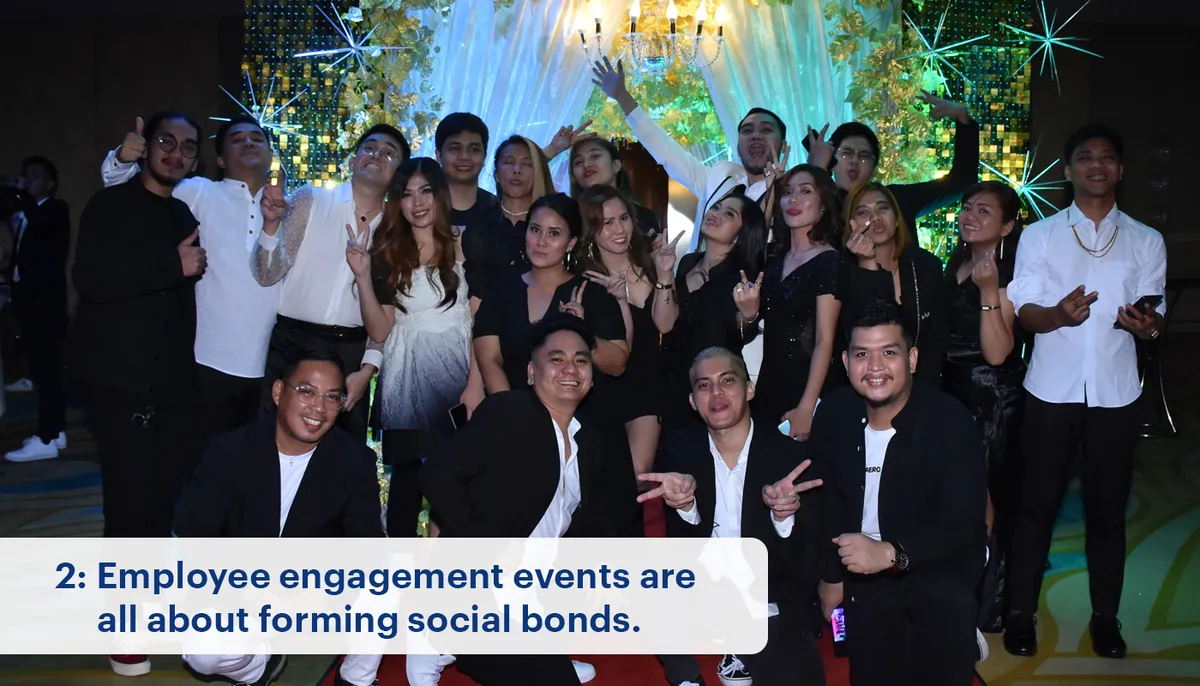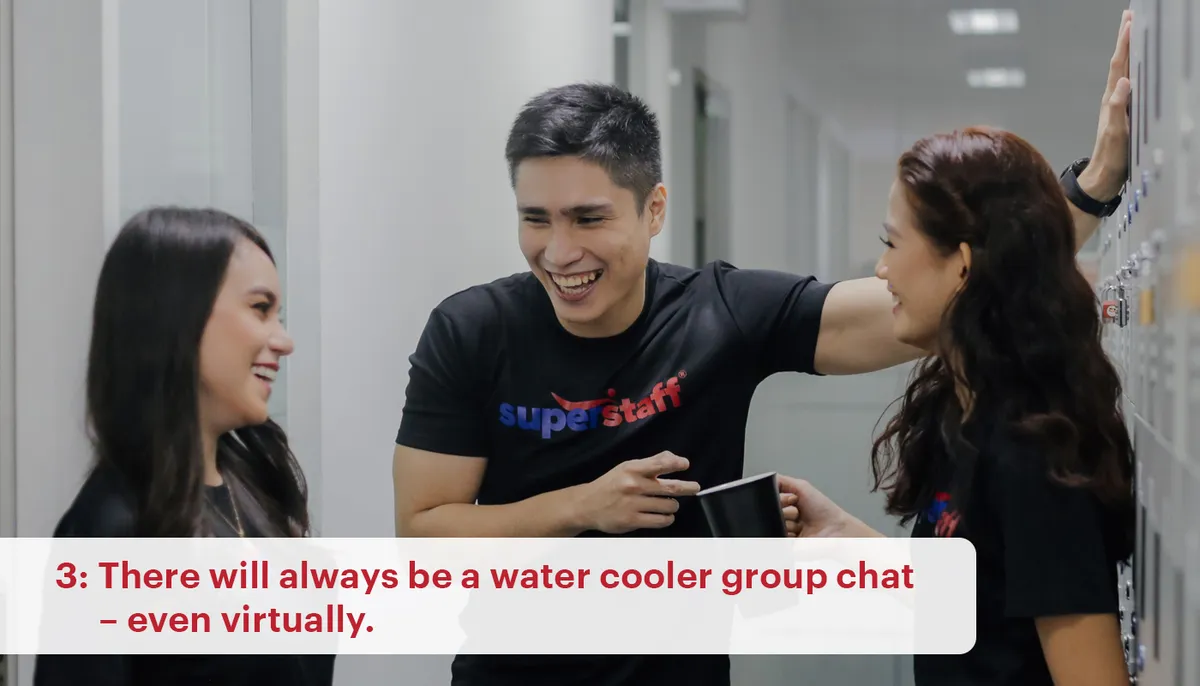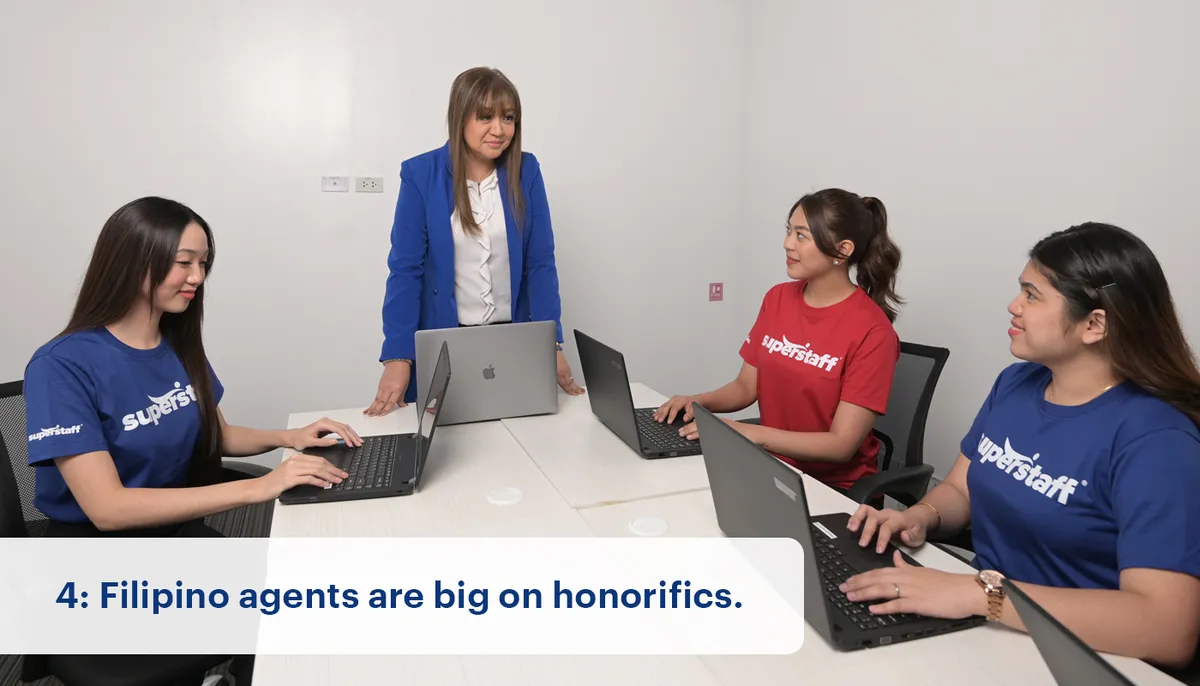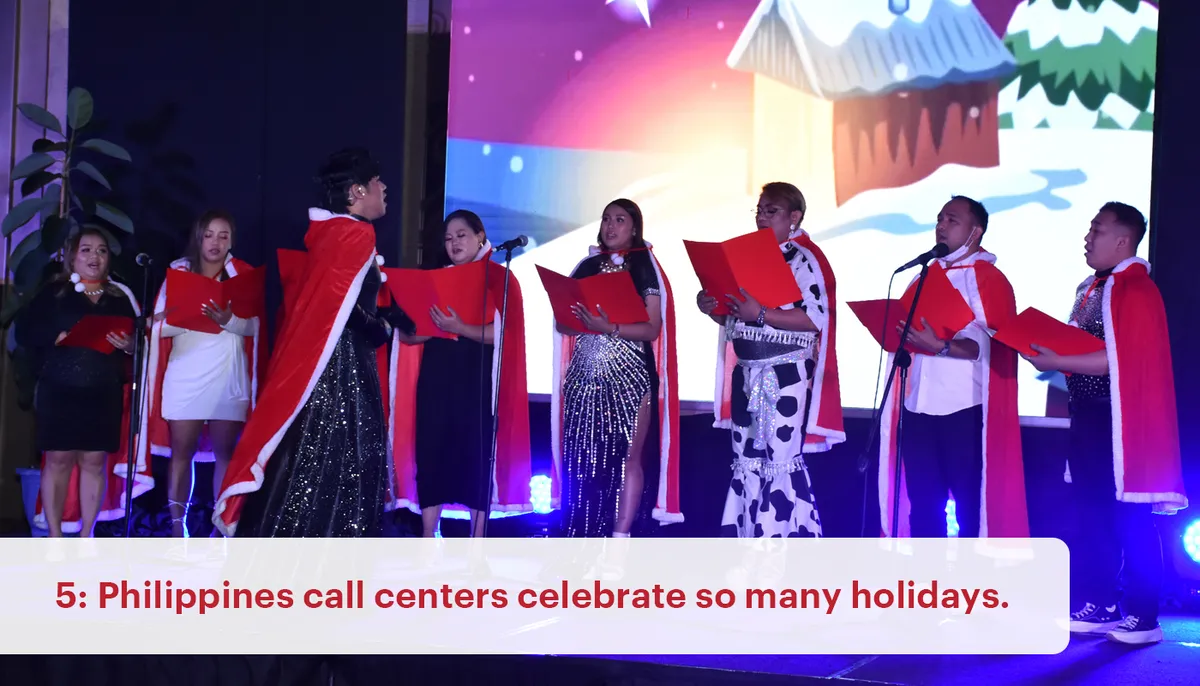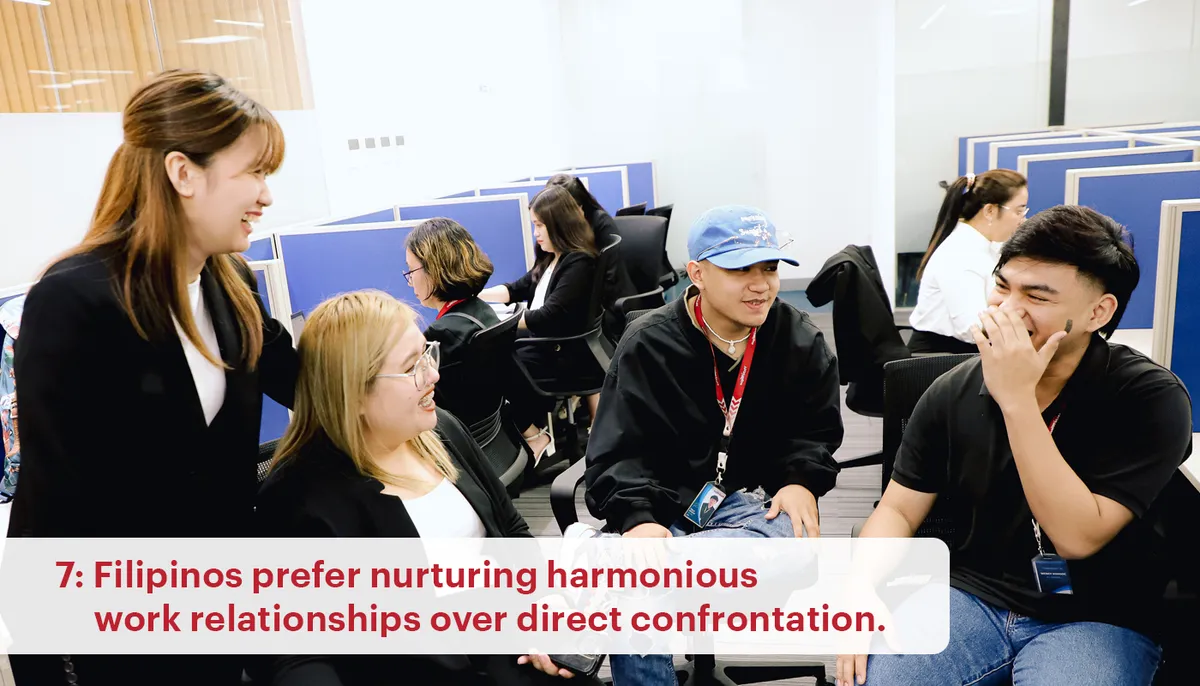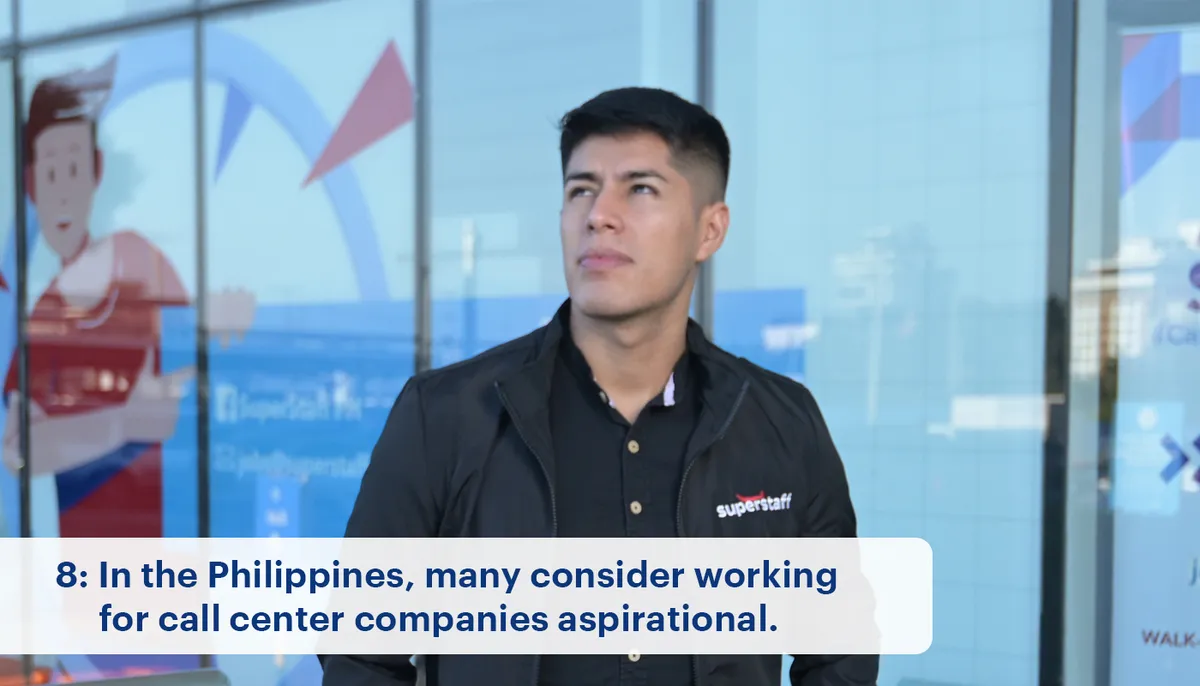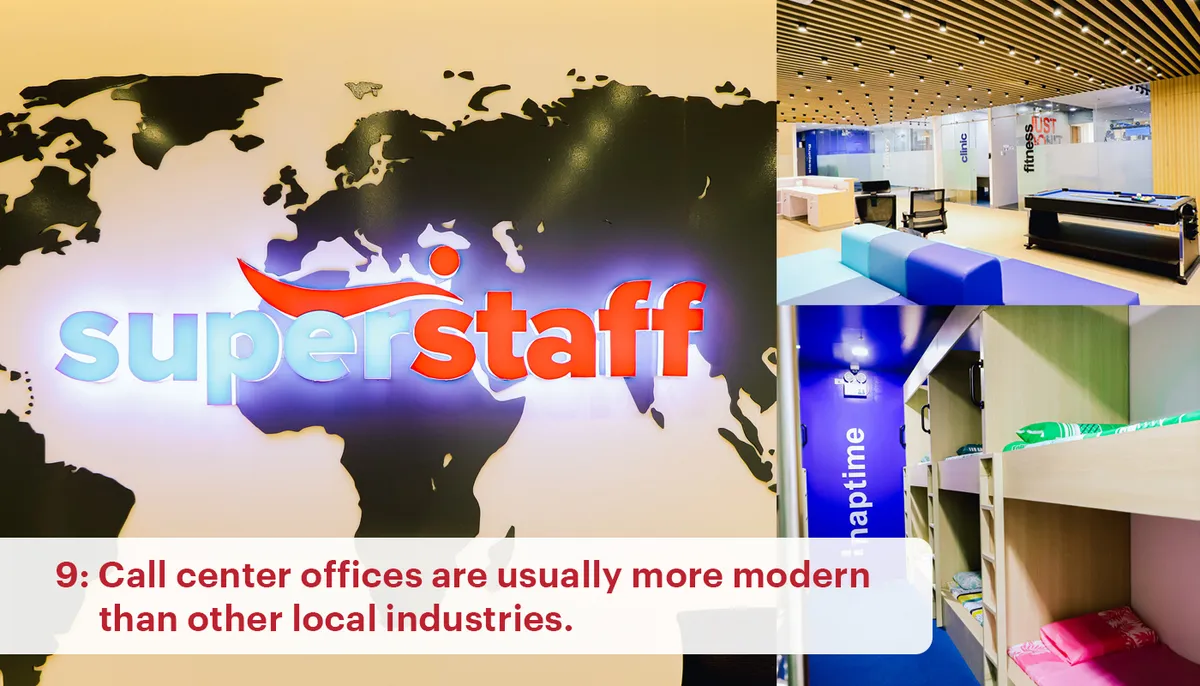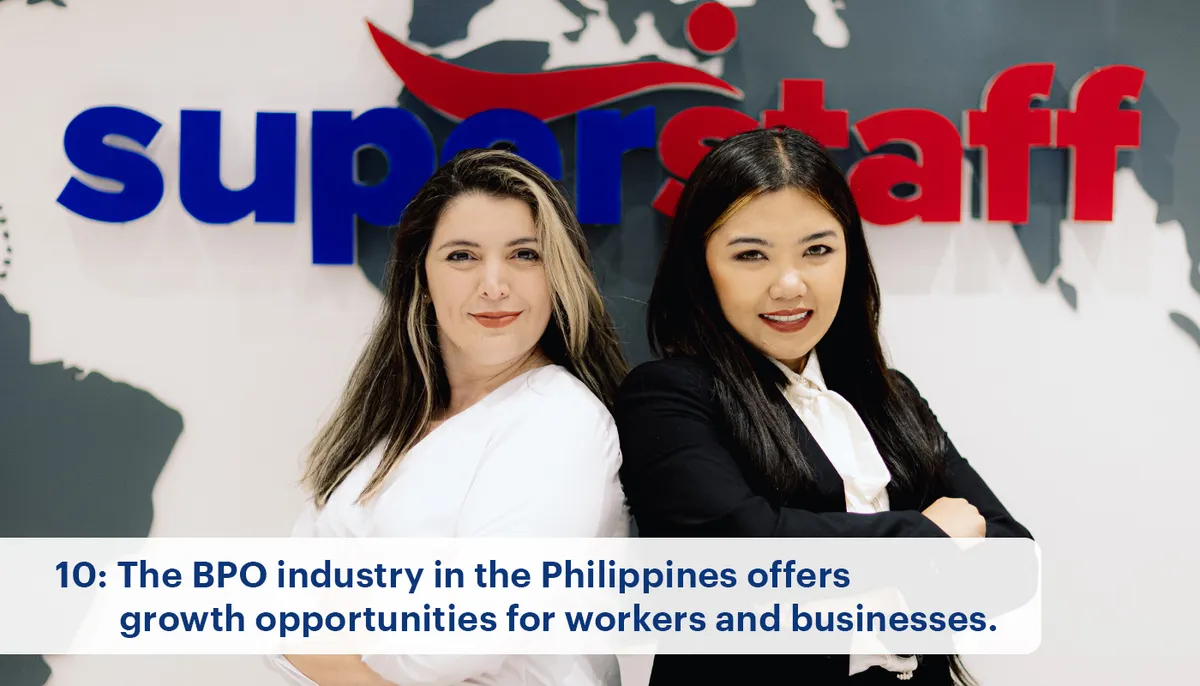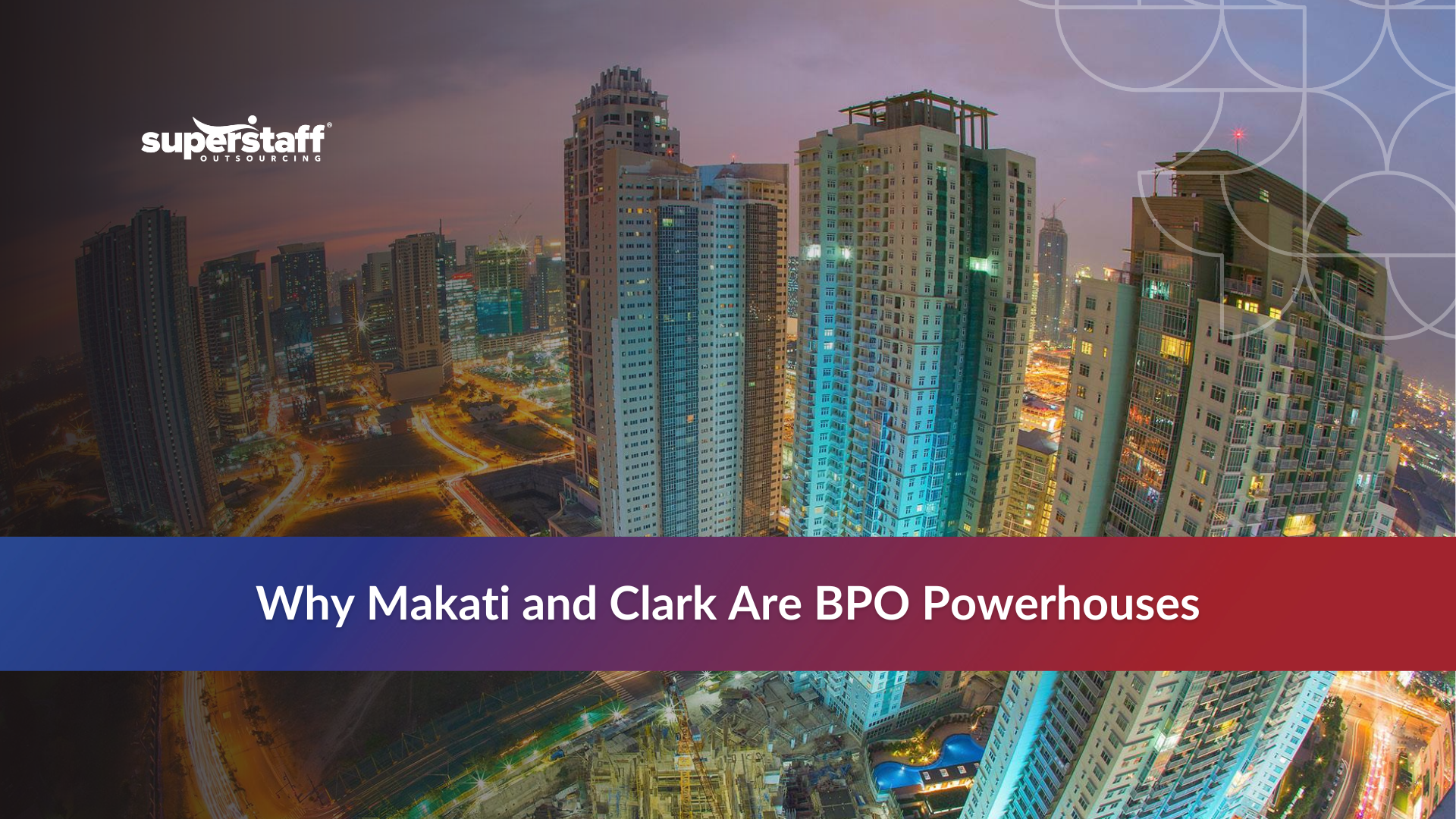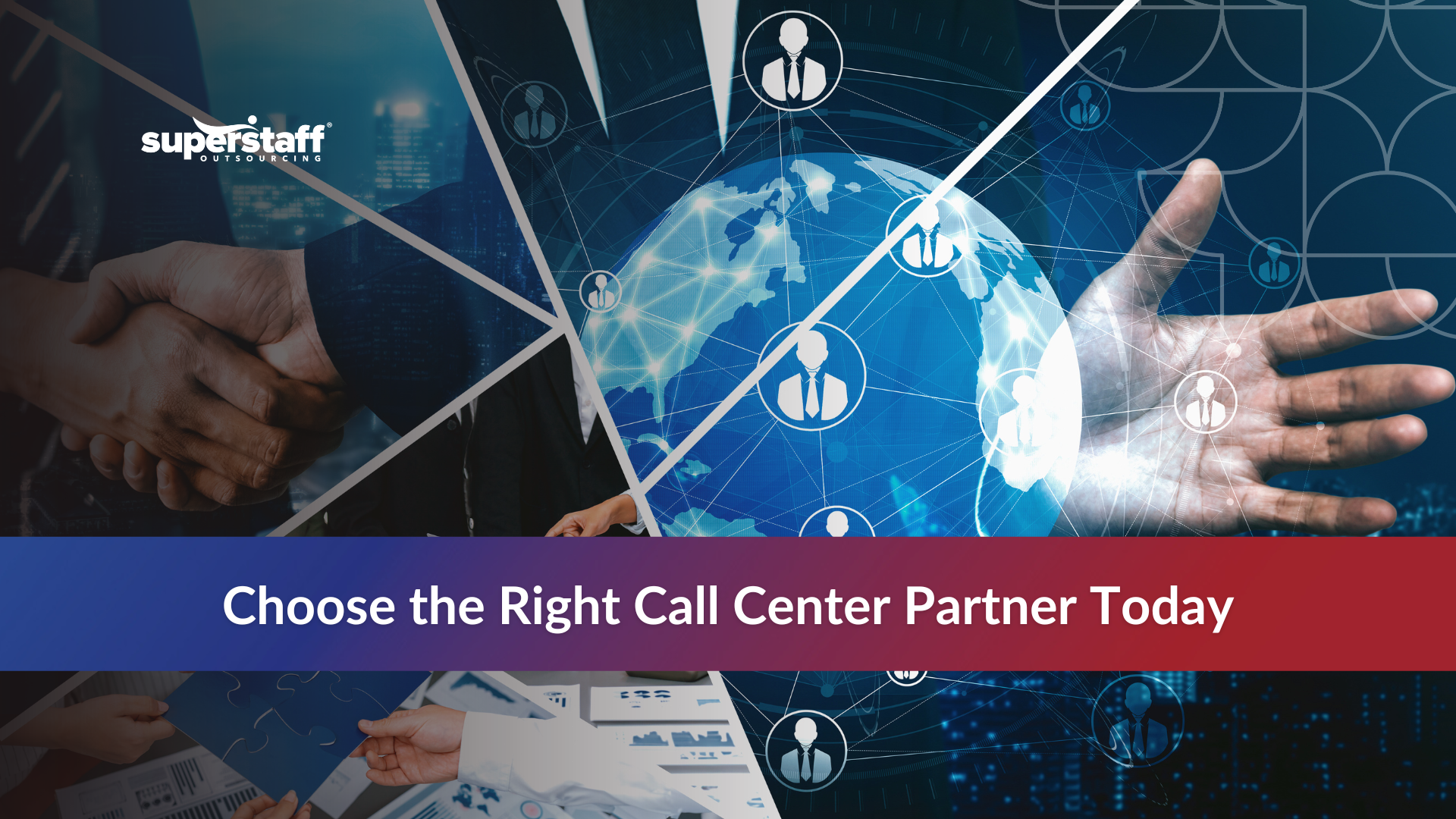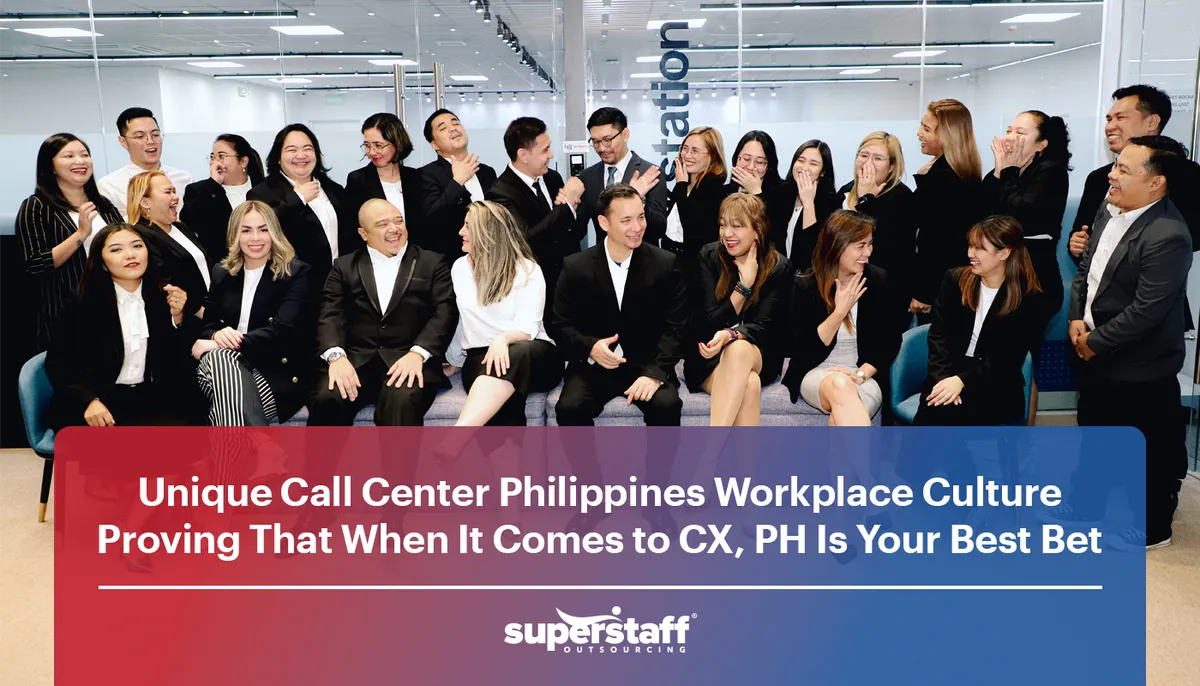
When you first hear “Philippines,” you may think of stunning beaches, famous singers, and Jollibee fried chicken. But did you know the country is also a great place to work and do business?
It’s true. There’s a reason why the Philippine outsourcing industry has become renowned worldwide for its top-notch customer service and friendly, empathetic agents.
Want to know the secret sauce? Providing an exceptional customer experience starts with taking care of the employees – this is where the local work environment excels.
To understand why Filipinos are masters at CX, look at how BPO companies approach employee experience.
Unique Things About Call Center Philippines Workplace Culture
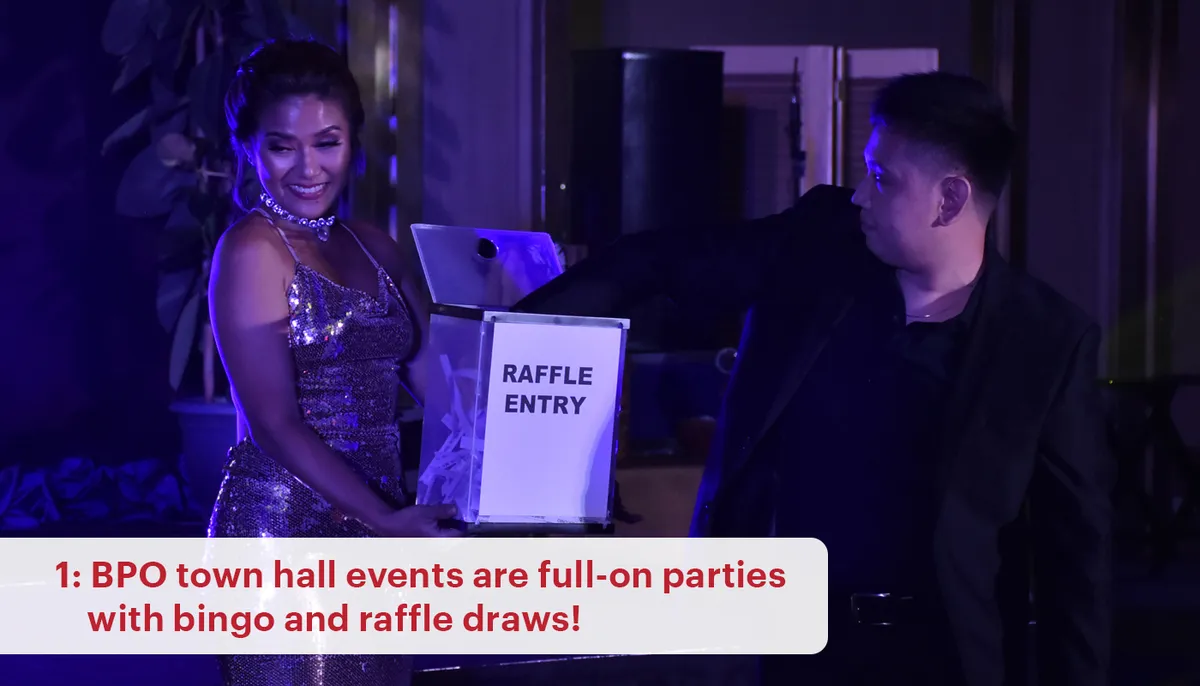
If you’ve never worked with Filipino call center agents, you may be surprised at how different their workplace culture can be from their American counterparts.
Generally, town hall meetings in the U.S. are treated as fairly serious and straightforward. It’s all business all the time.
Meanwhile, Filipinos take a more casual approach. Beyond discussing pressing company matters, BPO town hall events are more like celebrations, with raffle draws, bingo, games, karaoke challenges, and even talent competitions.
As the local tourism slogan says, “It’s more fun in the Philippines.” Honestly? Sign me up for the party!
That party vibe? Call center agents bring it when attending to customers’ calls. Even while working the graveyard shift, employees remain jovial from dusk till dawn.
The truth is that the Philippines as a whole emphasizes close-knit communities and forming social bonds. That’s why employee engagement events in the country focus on team building and bonding.
Local contact centers often have regular company-wide events like overnight summer retreats, holiday gatherings, virtual get-togethers, and year-end parties.
More time spent socializing in the office equals closer friendships and deeper work relationships.
And having tight-knit friend groups can lead to higher employee engagement and satisfaction. It’s a win-win!
Ah, yes. The classic water cooler chat.
It’s the time when co-workers take a quick break to talk about fun topics outside of work, often while standing around the office water cooler.
Even without a literal water cooler, Filipino call center outsourcing workers, whether onsite or while working from home, have a dedicated group chat for socializing. That’s how much they value forming friendships at work.
Their work bond boosts employee retention, elevating overall customer satisfaction.
Here’s another fun fact about Philippine call centers that many Americans may be surprised to learn: Using honorifics is a must in the workplace.
In the U.S., you wouldn’t think twice about calling your boss by his first name. But that same behavior might get you in trouble in the Philippines.
Filipino customer support representatives call their bosses (or other perceived authority figures) “ma’am” or “sir.” Higher-ups with specific titles like Team Leaders or Operations Managers may be addressed as “TL” or “OM” by their agents.
Older colleagues, even when not in a direct position of authority, may be called “ate” or “kuya” (big sister or brother) by their co-workers.
For Filipinos, using these honorifics is a sign of respect. And the good news is that they carry over this behavior when speaking to customers, which can be really helpful when dealing with frustrated, angry, and furious callers.
There’s nothing Filipinos love more than celebrating the holidays with their family and friends.
In fact, the country has a whopping 18 national holidays each year – not even including special barangay and city-specific celebrations!
It’s also common for local BPO companies to change their office themes, decorations, and even pantry snacks, depending on the occasion. This way, employees can feel the holiday spirit even while working.
Did you know Filipinos have mastered hyper-personalization before it became a big customer experience buzzword?
Believe it or not, personalization is inherent to Filipino culture because they place a high value on empathy and hospitality.
When bringing a visitor into their home, Filipino families often cater their food to the guest’s preferences. They also take the time to clean all the rooms and sometimes add decorations to ensure the guest feels at home.
In professional settings, the same basic principles apply. Filipino agents are flexible enough to change their approach depending on the caller’s reactions.
Americans prefer direct communication in the workplace, cutting right to the chase when an issue needs to be resolved.
Filipinos? Not so much.
Like other collectivistic societies, Filipino culture values peace and harmony above all. So, they tend to take a more relaxed, less aggressive approach to work conflict.
This is why you likely won’t see heated debates, open disagreements, and strong criticisms in a Philippine call center.
Instead, everyone will try their best to share opinions diplomatically and politely, using subtle cues to express disagreement.
Some may find this approach inefficient. However, one advantage of this non-confrontational culture is that Filipinos give off a friendlier, more pleasant, and agreeable vibe when dealing with customers – very helpful for de-escalating issues and preventing client turnover.
While other nationalities may see call center work as a dead-end job, Filipinos view it as an opportunity to advance their careers and earn good money.
Thanks to the Philippines’ overall lower cost of living, multinational companies can save on costs while also giving local workers lucrative job opportunities.
Many university graduates in the country prefer working for business process outsourcing (BPO) companies because of the higher salary ranges and comprehensive benefits package, including health insurance and retirement.
Plus, it’s the workforce’s way of providing for their families. Filipinos are very family-centered and will work hard to build a better future for their loved ones.
Another fact you may be surprised to learn is that the offices for call center services in the Philippines are often “fancier” and more modern than other industries.
According to the 2023 Offshore BPO Confidence Index, industry experts agree that the country’s commercial property market is highly competitive.
Local BPO offices have earned a confidence rating of 91.1% for leasing flexibility, available “plug and play” centers, and the number of options across multiple cities.
The study also highlighted the availability of flexible co-working spaces for short-term CX delivery (88.9%).
Urban hubs like Makati, Pampanga, Bonifacio Global City (BGC), and Cebu have a wealth of available buildings and infrastructure to accommodate the growing demand for offshore outsourcing solutions.
The Philippines is considered a top-tier outsourcing destination for good reason. With its vast talent pool, global companies will have no trouble finding and recruiting highly qualified and English-proficient employees.
You may wonder, “How many call center agents in the Philippines can I find?” Let’s see what the global industry experts have to say.
In the 2023 report above, BPO leaders agreed you’d have no trouble hiring quality front-line agents and experienced supervisors in the Philippines – receiving a near-perfect confidence rating of 97.8%!
When it comes to voice (97.8%), non-voice (97.8%), customer care (97.8%), and operational leadership (86.7%) roles, industry experts’ confidence remains sky-high.
Thinking of Outsourcing to the Philippines? Connect With the BPO Professionals at SuperStaff!
Did you enjoy learning these things about call center Philippines’ workplace culture? This brief overview is only the first part of your outsourcing journey.
The next step is to work with a BPO provider who can help elevate your customer experience strategy. And here’s where SuperStaff can be your dedicated call center partner.
Whether you’re ready to outsource to the Philippines today or need more information before taking action, don’t hesitate to contact us. We’ll be here to answer any of your questions and concerns!

